Gambia’s D1.8 billion project awarded without due diligence
Four months after signing the contract and credit facility for the grand Banjul project, the Government claims it is reviewing the project documents but it is tight-lipped on what is wrong in it.

By Mustapha K Darboe
On February 16, 2019, even the then not so known simmering tension between President Adama Barrow and his former vice president Ousainu Darboe could not get in the way. Both leaders were on the streets of Banjul to do what was lauded as an infrastructure project that will define the legacy of the new president.
It was the launch of Banjul roads, drainages and sewages project. Banjul, a city whose roads lay in ruins, represents everything wrong with the Gambia, said the officials. Country’s Works Minister Bai Lamin Jobe called it the most urgent project for the transitional Government. The project costs taxpayers over a whopping 1.8 billion dalasi.
The contract, a copy of which was obtained by Kerr Fatou, was awarded in February and signed on May 11, 2019. However, when confronted with the details in an already signed document, both permanent secretary at the Ministry of Finance, Mod Secka, and Minister of Works Bai Lamin Jobe claimed the documents are being reviewed.
Jobe told Kerr Fatou that the document accessed by this medium is outdated and has recently been amended. However, Jobe could not provide the updated contract document.
On questions regarding the credit facility, Secka who witnessed the signing of the original document by his minister Mamburay Njie could not provide any detail either.
“…We are still discussing on the details of the project and we have no firm position yet,” Secka told Kerr Fatou on September 23.
“Given what is emerging, it looks like the credit facility will not be needed anymore. Of course, if it is to proceed it will follow due process including the National Assembly. (I) will update you once something firm is agreed.”
But this credit facility that defined the Banjul project was signed and finalized on May 11. The work of the contractor is also continuing.
“This project is signed already. Are you reviewing the document already signed and why? And I am told the IMF (International Monetary Fund) has made some recommendations on it, what were they please? Also, if a new contract exists, can I have it?” asked Kerr Fatou.
And Permanent secretary Secka responded: “Like I said there is nothing final as yet”.
The project was awarded to Gai Construction, a company own by Haddim Gai, without tender. The claims of Works Minister Bai Lamin Jobe were that the project was to be pre-financed by the company and tendering is not the norm under such circumstances.
What is in the contract?
The contract document contains the agreement, Gai’s project proposal, general conditions of contract, financing agreement and the work program.
These documents were critically reviewed by a contract law lawyer for Kerr Fatou. According to our competent authority, the credit facility of the agreement should have had the approval of the National Assembly before the project starts. This process was overlooked, thus violating the Gambia Public Finance Act 2014 (Check Section 36 (h)).
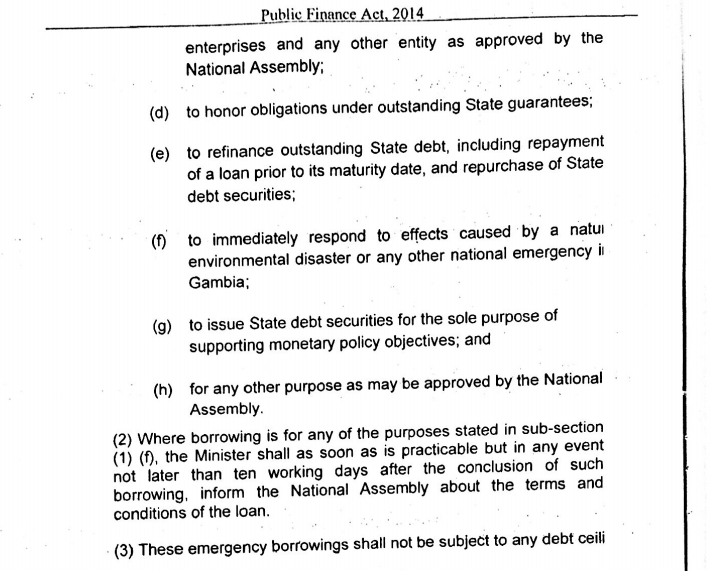
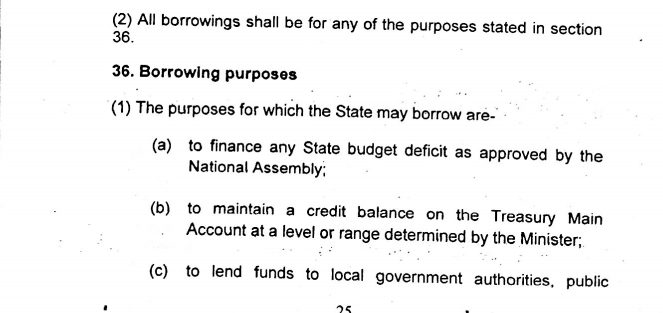
“The Banjul roads, sewage and drainage project did not come to the National Assembly for approval,” confirmed Samba Jallow. Jallow, the minority leader of the lawmaking body, is a member of the National Assembly Government Project Monitoring Committee.
“… No part of the contract was brought to the parliament. It is a PPP (Public Private Partnership). There is no requirement for Government to bring PPPs to the National Assembly,” said Jallow.
Jallow claimed the project is not a loan deal. “We do not take this as a loan… It is a PPP,” said Jallow. However, the credit facility of the contract clearly defined Gambia Government as the borrower and Gai as the lender.
And the National Assembly Project Committee has requested for the project document from the Finance Ministry though they are yet to have it.
“We have requested the project document from the Finance Ministry about two months ago but we are yet to have it,” said Sulayman Saho, chairperson of the Committee.
Meanwhile, the credit facility did not show Gai’s financing plan of the project. Clause 2.2 of the credit facility refers to a financing plan to be provided by Gai Construction in Schedule 4. But Schedule 4 is mere blank page in the credit facility.
Thus, the contract fails to show how the US$35, 720, 000 will be disbursed to the Government and in what manner.
However, the Works Minister claimed Gai’s financing plan is in the contract document. He said the credit facility of the project has also been amended after a Government meeting with delegates of International Monetary Fund.
In addition, two clauses in the contract on the mode of payment are contradicting. The clause 6.1 of the credit facility states that the loan is to be paid through a five-year installment plan. Whereas, Schedule 6 of the same document shows that the payment is spread over a period of six years starting February 2020 to 1st February 2025. Minister Jobe also claimed the number of years for a payment plan has changed though he could not say to how many years.
And in the pre-financing agreement, the Government will start paying Gai for its works barely a year into it. According to the credit facility, the Gambia Government will pay US$5, 960 000 to Gai beginning February 2020.
Despite this payment to be made, the Works Minister Jobe claimed to lawmakers in June 2019 that the rationale behind accepting the pre-financing deal from Gai was because the country does not have money.
A top government official close to the work told Kerr Fatou that the pre-financing claims were a cover to justify single-sourcing the project to Gai.
“They could not put it in the 2019 budget because at the time this contract was approved the budget was already drawn,” said an anonymous source.
Also, a special challenge was the mode of payment. According to the credit facility, the repayment of the loan is to be made in only United States dollar. “Any payment which is due to be made by the borrower (Government) under this agreement shall be made in United States Dollar,” stated Schedule 12.3 of the credit facility.
Dr Ousman Gajigo, an economist and former employee of African Development Bank, told Kerr Fatou that the payment in United States dollar will be problematic for the Government. “It is highly problematic in this case to have a contract denominated in US dollars instead of dalasi. After all, both parties are non-foreign. So, it’s a form of malpractice for officials to contractually obligate the government to pay such high sum in foreign currency knowing that the country’s foreign exchange reserve is limited,” said Dr Gajigo.
Despite the high cost of the contract and the risk involved, the contract limits the liability of Gai to 5% in respect of damages. And the Government is given a time limit of 5 days for payment of over $US5 million yearly installment.
And clause 12.5.1- required the Government to make payment on the due date and not later than 11am.
Also curious was the discrepancy in the cost of the project provided by President Adama Barrow. During his speech at the launch of the project, the Gambian leader mentioned $35.6 United States dollars as the cost of the project.
“…We are aware of the importance of durable infrastructure for the socio-economic development of the country. Thus, given the urgency of the project, Government has committed US$35.6 million for its implementation,” said the President in his statement.
But not just the president, even the State House official Facebook page said the project cost $35.6 million. However, the project document contradicted the President’s figures. The credit facility of the project puts its cost at $35. 720, 000. This represents a discrepancy of $120, 000.
Gai Construction or Enterprise?
Despite the hype, this is the first billion-dalasi contract won by Gai. The project documents do tend to confuse Gai Enterprise and Gai Construction, at least in one instance.
Little is known about the company in public space. However, both Gai Enterprise and Gai Construction are owned by Haddim Gai also known as Sering Gai. Sering is a Gambian national of Senegalese origin. Until 2014, Haddim was a vendor selling mostly office equipment.
According to information from the company records at the Justice Ministry, Gai Enterprise is a sole proprietorship which still exists. However, Mr Gai established a limited liability company on May 31, 2018 with 3 shareholders. The company is Gai Construction Company Limited.
The Gai Enterprise was solely owned by Sering Gai and it was registered on May 20, 2014.
The company’s shared capital was ten million dalasis (GMD10, 000 000). Both construction companies are existing according to the registrar’s office.
However, the Gambia Revenue Authority office in Kanifing only has the file of the Gai Enterprise as of September 10, 2019.
But the Gai Construction which was awarded the Banjul project has no file at the tax office over a year, four months after it was established.
According to the registration data of the Gai Construction, its head office is along Bertil Harding Highway meaning its tax file should be at the Kanifing GRA office.
“By law this company should have filed a corporate tax returns by 31 March 2019,” said our source.
“Unless if a business has filed for an extension of one month, it is expected to file its tax returns (business activity including expenditure and revenue) on March 31 of the following year… If this is not done, you are charged for late or non-filing which is D5000.”
That hasn’t been done yet

How it all began
On September 13, 2018, the Office of the President sent a letter to the Works Ministry indicating that it has received a letter of intent from Gai Construction Company Limited for the “rehabilitation of Banjul roads, sewage and drainage systems”.
“As a local construction company with records of executing similar projects in Banjul, approval has been granted for the company to provide the following documents for the consideration of your Ministry and other stakeholder ministries copied below: detailed study and design, project implementation work plan, bill of quantities, budget estimate, terms and conditions of financing and draft contract,” said the letter.
The Works Ministry was required by OP to draft a Cabinet Paper on the issue. The letter also indicated that an approval has been granted for the National Road Authority and Ministry of Lands and Regional Government through Banjul City Council to be probable contracting authorities.
So the Gai Construction Company started with a shared capital of 10 million dalasis on May 31 2018 and sent a letter of intent to do the Banjul project barely 3 months later. Though OP claims Gai is a local company with records of doing similar projects, no such thing exist in reality.
However, the sole proprietorship owned by Sering Gai had started in 2014 as its tax records show. As far as records are concerned, Sering’s Gai Enterprise made a turnover of D239 million in total in 2017 and little under D300 million in 2018.
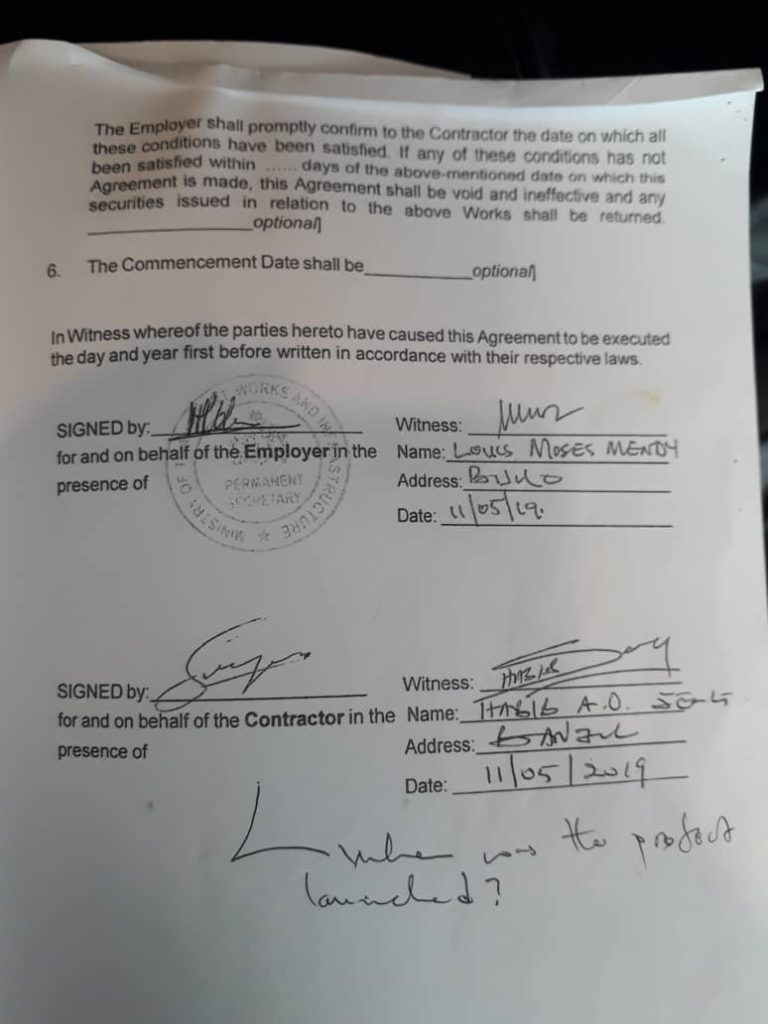
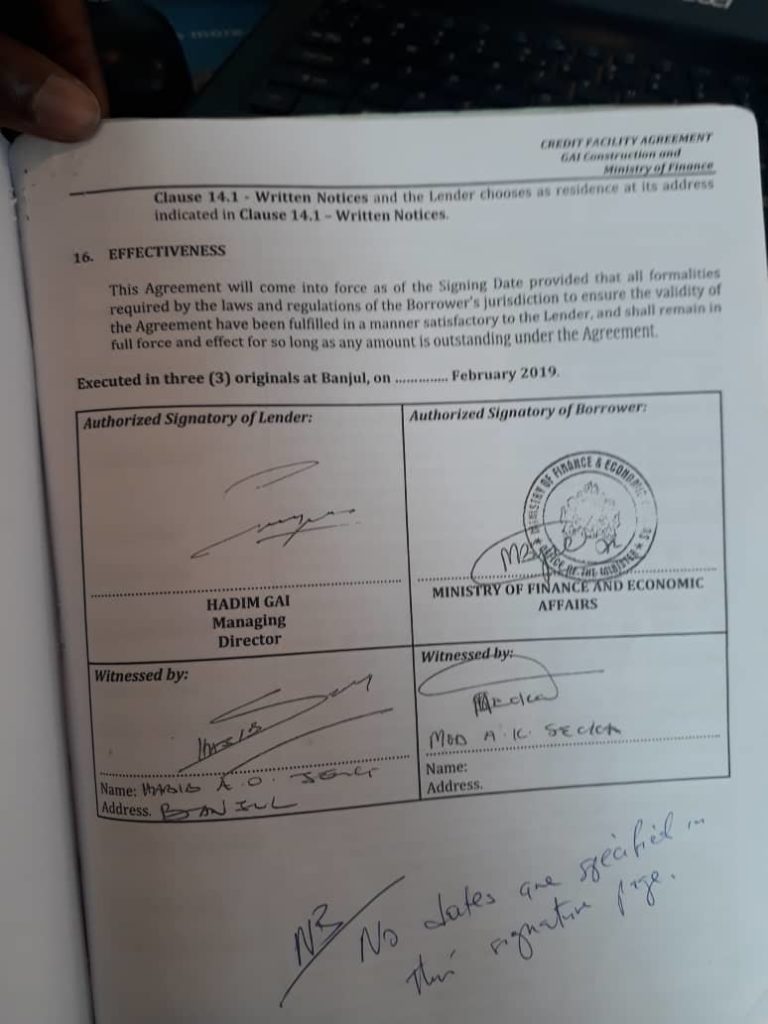
Shutting out oversight bodies/ technical institutions
Kerr Fatou has been on the Banjul Project since early 2019 but little information is available about the project in the open. The contract documents are shrouded in secrecy. But journalists were not the only frustrating parties. The mayor of Banjul also was.
Late May 2019, Banjul Mayor Rohey Malick Lowe has confronted the Works Minister Bai Lamin Jobe about the project.
“I have not seen the project document and I do not know anything about it… I am the mayor of Banjul. I should see the project document so that we could know the cost of the project, when it will finish and others,” said Lowe.
“Journalists and activists are always asking me… I have tried to find out information from Haddim Gai and Local Governments Minister but no one gave me any information.”
Lowe’s office still plays no part in the project nor has she any idea about it, her spokesperson Momodou Lamin Bah told Kerr Fatou.
Also shut out is the National Road Authority. The Authority’s board and management have also complained of being left out of it. In a letter to Works Minister on June 12, Edi A. Njie, the board chair complained that the NRA board is sidelined on the Banjul Project.
On July 4, Kerr Fatou contacted the managing director of the National Road Authority, Momodou Senghore, for information on the Banjul Project but he referred this medium to Works. “Go to the Ministry of Works because they are the ones in charge,” said Senghore.
He made no further comment. Another institution empowered by law to provide oversight over Government’s approval of projects is Gambia Public Procurement Authority. Regarding the Banjul project, GPPA has no involvement in the process.
The project was reportedly approved by the cabinet, the highest decision making body of the state but that lacks capacity to vet proposals without Government’s technical bodies.
The managing director of GPPA told Kerr Fatou on July 1 that they got to know about the Banjul Project after it was approved by the cabinet.
Abdoulie Tambadou said they would have wanted a “public tender” because they are there for “transparency, accountability and giving chance to all tenders”.
In June 2019, the Works Minister told lawmakers that the Banjul Project is an EPC which simply means the company will pre-finance the project— all of its Engineering, Procurement and Construction.
“The Ministry proposed and cabinet approved the option of using Engineering, Procurement and Construction (EPC) contract arrangement whereby the Ministry will consider proposals from reputable contractors willing to pre-finance the works by at least a year after which Government will commence to pay by installments,” said Minister Jobe.
In his submission, Jobe insinuated that there were proposals whereas the only proposal received was from Gai which in fact was sent to them through the Office of the President.
Tambadou said though the GPPA Act did not specifically mention EPC but the law is clear that all “contracts or procurements using public funds should go through the Authority”.
But unfortunately the GPPA did not also protest. Tambdaou said they did not tell the authorities that the process should have been tendered. “That is not our responsibility… Cabinet is above all of us,” said Tambadou.
“After cabinet approval, we were informed… We did not play any role in the awarding of the contract.”
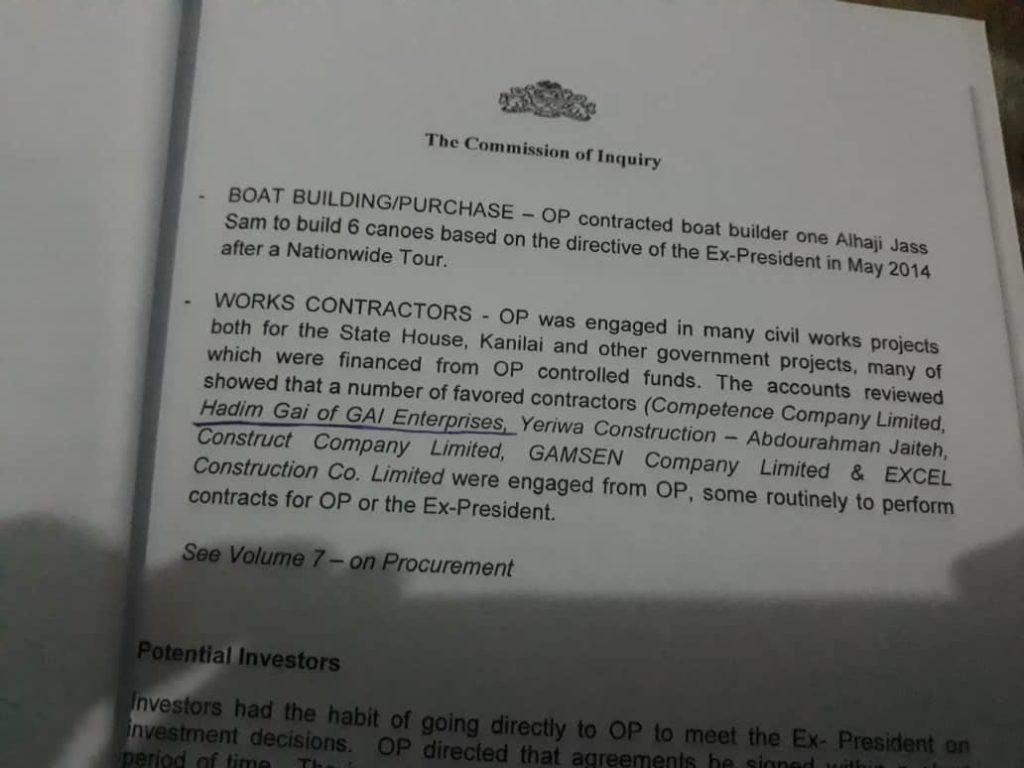
Single-sourcing regular benefactor
Of the two companies, Gai Enterprise and Gai Construction, the authorities could have relied on only the Enterprise for Gai’s work records. The company that sent a letter of intent to the Presidency was barely 4 months after it was registered.
The letter sent to the Works Ministry for them to prepare a cabinet paper on the project was on September 13, 2018. That was preceded by whatever proposal Gai may have sent to Office of the President. And construction was registered on May 31, 2018, suspiciously for this project.
So while the Banjul Project is the limited liability company’s first major contract, the Enterprise had existed since 2014. And this is certainly not the first time companies affiliated with Gai will have Government contracts single-sourced to them without due process being followed.
In June, 2015 Gai Enterprise was single-sourced a contract that was not vetted by the GPPA to build a bus parking and two storey buildings at the Office of the President to a tune of over D27 million. This contract was scrutinized by the commission of inquiry into the financial transactions of the former president Yahya Jammeh.
According to the Janneh Commission, D10 million advanced payments was done for this project from the Gambia National Petroleum Corporation Access Bank Account and D5 million from the GNPC Skype Bank Account. The Commission said the Works Ministry was not aware of this project and it was supervised by former state guard commander one Essa Tamba and Yahya Jammeh.
“Mr Haddim Gai admits that normal procedure in awarding him the contract was not applied, but said as a businessman if he is offered as contract of a certain amount, he would take it. Gai Enterprise also received payment of D200, 000 from the Tax Recovery Account at Trust Bank Limited… which he said was for the renovation of the Kotu Bridge. In awarding the contract he said he was called by Bala Garba Jahumpa the then Minister of Works to carry out the works,” said the Janneh Commission in its report Volume 7, pages 55 and 56.
“The contract awarded to Gai Enterprise for works at the State House was not in compliance with procurement rules. There is no evidence of other works awarded to Gai Enterprise contrary to procurement rules,” added the Janneh Commission on page 59 in its report Volume 7.
In its Volume 7, page 67, the Janneh Commission has asked the Gambia Public Procurement Agency to issue a warning to Gai Enterprise and its director Haddin Gai. Similar warnings were to be issued to Yeriwa Construction and Excel Construction Co. Ltd.
However, the Government White Paper did not mention the warning to Gai and others. Abdoulie Tambadou, the director of the GPPA, told Kerr Fatou on September 18 that he was not aware of the Commission’s recommendation to issue a warning to Gai and others.
But the Jammeh administration was not the only one that single-sourced contracts to Gai. President Adama Barrow’s administration also did.
In 2017, the Barrow administration single-sourced a contract to Gai for the purchase of furniture, household items and other decorations for the State House to the tune of over D21 million. This single-sourcing was given “no objection” by GPPA, a practice criticized by the Internal Audit Department in its audit exercise of the GPPA 2017. This was the time when the presidency was at the vice president’s residence in Fajara.
This project was then followed by the Banjul project in 2019 which was also single-sourced in the name of EPC.
For Gai, he simply did nothing wrong. Gai said his companies have not been given an undue advantage by the state.
On September 21, Gai told Kerr Fatou that all contracts awarded to his company had followed the rules. “I can show you all the documents of the work I have with the Government…,” said Gai.
He said he has begun work on the Banjul project and the nature of the contract does not unduly favour him.
“If you understand it (Banjul project), you will appreciate it,” said Gai.
But Gai Enterprise was not only an alleged single-source benefactor. Gai Enterprise was also accused of receiving illegal payments by Auditor General’s office.
In 2016, the Gai Enterprise was accused by Auditor General for receiving “illegal payments” and poor work at the Social Security Brikama Jamisa and Tujereng housing estate.
“During review of payments made to the contractor (Gai Enterprise) in respect of construction of roads and culverts at Brikama Jamisa and Tujereng, we noted that a payment of D18, 800, 000 (Eighteen million, eight hundred thousand dalasis) was made to the contractor on 7 May, 2014 as refund for basalt stock said to have been purchased and deposited at the sites, approximately one year after the contracts should have been completed. We could not understand the reason why this refund was made to the contractor, since basalt needed for both works was factored in the cost of the contract. According to the management this came as a result of difficulties encountered by the contractor with regard to the purchase of Basalt. Clearly, this is not accurate as the basalt was already purchased and deposited at the sites according to the invoice from the contractor. The terms of the contract were breached. Therefore, the payment was illegal,” said the auditor.
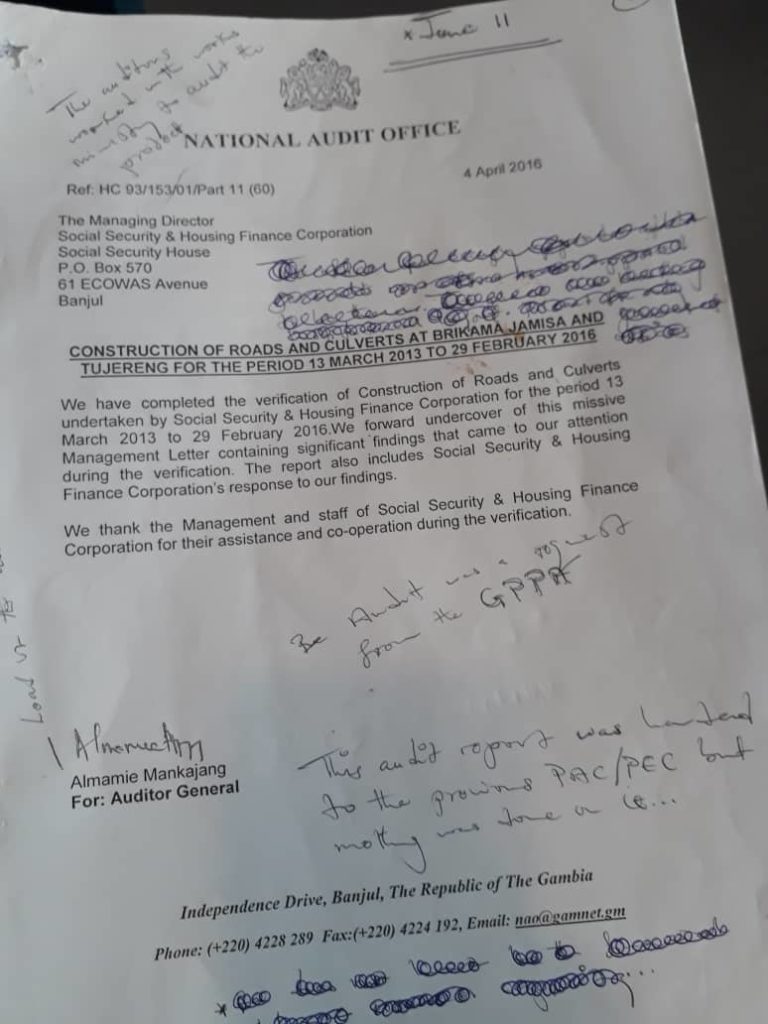
The auditors have also found that the withholding tax that was also supposed to be paid from the contract was given to the company, even though the contractors claim that was a mistake which was corrected.
What information did cabinet rely on to award Gai?
From the onset, the position of Works Minister Jobe was that the Cabinet approved the awarding of the Banjul project. However, there is no information in the public space on what the Cabinet may have relied on to award the contract. Certainly, the agreement with the company was signed after the supposed Cabinet approval and its launching.
However, there was not detailed document explaining what cabinet looked at to get to that conclusion.
At the time of the launch of the project, Ousainu Darboe was the vice president. In the aftermath of the launch of the project, Darboe and President Barrow’s joint image showed up on social media as a symbol of the launch.
However, the United Democratic Party leader said he does not have any information on the Banjul project.
“Of course, I recalled that when the issue came up in cabinet— not the project document— but then there was indication by the honorable Minister (Bai Lamin Jobe) that this project was to be pre-financed. And my question was that were there other financiers who might be interested. The minister said no other interested party has surfaced but then it is open and they will consider any other person who is interested…,” said Darboe.
But Darboe said he is not aware of any cabinet decision on the issue. “As far as I know, the day I raised this issue, no decision was made on this issue. And as far as I know, I was not part of a cabinet meeting that took any decision on this issue,” added Darboe.
The UDP leader said he was invited to the project launch by Works Minister Jobe and he attended as protocol demanded. However, he played no role in it.
However, Minister Jobe disagrees. He said Darboe was at the cabinet meeting that deliberated on the project and approved it awarding to Gai.
Gov’t denies any wrongdoing
Despite his own admission that they are reviewing the contract document four months after its signing, the Works Minister remains confident that Government broke no law or violated any procedure. For Minister Jobe, the urgency to fix the deplorable condition of Banjul is enough justification to single-source the project.
“The message we give cabinet is that we cannot drag this and this is the only visible way we see…We were faced with a situation that required an urgent and expedient measures…,” said Jobe in an interview with Kerr Fatou.
“We are more interested in fixing Banjul and … that is what it would cost…”
The Works Minister said Gai has the capacity to do the work assigned to him.
“As far as people in this country are concerned, there is nobody more competent in this sector like I am… to make this decision (deciding which company is more competent to do the project) …,” said Jobe.
Jobe claims the procurement laws in Gambia and especially laws guiding single-sourcing are “not adequate”. Despite such claims, Government has not announced any plan to change the GPPA Act.


Comments are closed.